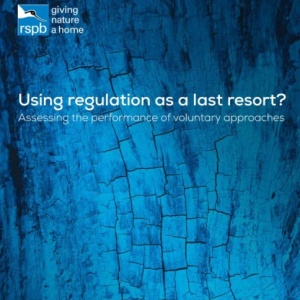
This report from the UK nature conservation charity RSPB assesses the effectiveness of voluntary alternatives to regulation (e.g. industry self-regulation, voluntary codes of conduct etc.) in seeking to achieve public policy objectives.
Entitled Using regulation as a last resort? Assessing the performance of voluntary approaches the report provides a review of the effectiveness of over 150 voluntary schemes across a range of sectors and issues to determine how well they perform. It is presented as the largest ever assessment of voluntary scheme performance.
The report looks at how voluntary approaches are currently used, designed and evaluated. It also assesses a list of schemes and provides a summary of their performance scores.
The research found nothing to support the claim that voluntary approaches can be an effective alternative to regulation and its results suggest that the impact of most voluntary schemes is quite limited, with over 80% of schemes found to perform poorly on at least one performance indicator. Many are undermined by limited private sector uptake and the resultant lack of a ‘level playing field’ for those that seek to genuinely improve their performance.
Two common features for success with voluntary approaches were however reported: they are found to succeed when private interests are aligned with social interests or where there is a real and credible threat of regulation. Best-practice design of voluntary approaches includes clear targets and transparent monitoring and reporting mechanisms.
When it comes to the costs of voluntary measures the report concludes that costs of monitoring and enforcement are mainly transferred from the public to the private sector and there was no compelling evidence to suggest, for the schemes that actually work, that costs are lessened. The essence of the report is that the government should regulate and not only rely on voluntary schemes given their limited effects and given the lack of evidence that they are more cost-effective.
Citation
McCarthy, D. & Morling, P. (2015). Using Regulation as a Last Resort: Assessing the Performance of Voluntary Approaches. Royal Society for the Protection of Birds: Sandy, Bedfordshire
The report can be downloaded here. You can find a useful blog-post discussing its findings by RSPB’s Martin Harper here.
Other research has come to a similar conclusion – for example see this study: “Scoping review of evaluations of voluntary agreements between government and business” which you can download here. Note that the role (and limitations) of voluntary agreements were discussed in some detail in the FCRN & Chatham House’s recent report on Policies and actions to shift eating patterns: What works?
See also more in other research library categories on about voluntary measures and approaches, industry actions/CSR, behaviour and practice theory, decision making tools, conservation.







Post a new comment »